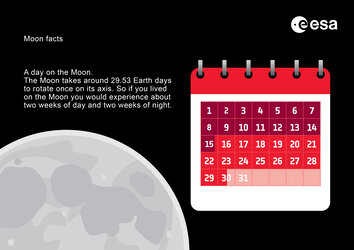Accept all cookies Accept only essential cookies See our Cookie Notice

About ESA
The European Space Agency (ESA) is Europe’s gateway to space. Its mission is to shape the development of Europe’s space capability and ensure that investment in space continues to deliver benefits to the citizens of Europe and the world.
Highlights
ESA - United space in Europe
This is ESA ESA facts Member States & Cooperating States Funding Director General Top management For Member State Delegations European vision European Space Policy ESA & EU Space Councils Responsibility & Sustainability Annual Report Calendar of meetings Corporate newsEstablishments & sites
ESA Headquarters ESA ESTEC ESA ESOC ESA ESRIN ESA EAC ESA ESAC Europe's Spaceport ESA ESEC ESA ECSAT Brussels Office Washington OfficeWorking with ESA
Business with ESA ESA Commercialisation Gateway Law at ESA Careers Cyber resilience at ESA IT at ESA Newsroom Partnerships Merchandising Licence Education Open Space Innovation Platform Integrity and Reporting Administrative Tribunal Health and SafetyMore about ESA
History ESA Historical Archives Exhibitions Publications Art & Culture ESA Merchandise Kids Diversity ESA Brand Centre ESA ChampionsLatest
Space in Member States
Find out more about space activities in our 23 Member States, and understand how ESA works together with their national agencies, institutions and organisations.
Science & Exploration
Exploring our Solar System and unlocking the secrets of the Universe
Go to topicAstronauts
Missions
Juice Euclid Webb Solar Orbiter BepiColombo Gaia ExoMars Cheops Exoplanet missions More missionsActivities
International Space Station Orion service module Gateway Concordia Caves & Pangaea BenefitsLatest
Space Safety
Protecting life and infrastructure on Earth and in orbit
Go to topicAsteroids
Asteroids and Planetary Defence Asteroid danger explained Flyeye telescope: asteroid detection Hera mission: asteroid deflection Near-Earth Object Coordination CentreSpace junk
About space debris Space debris by the numbers Space Environment Report In space refuelling, refurbishing and removingSafety from space
Clean Space ecodesign Zero Debris Technologies Space for Earth Supporting Sustainable DevelopmentLatest
Applications
Using space to benefit citizens and meet future challenges on Earth
Go to topicObserving the Earth
Observing the Earth Future EO Copernicus Meteorology Space for our climate Satellite missionsCommercialisation
ESA Commercialisation Gateway Open Space Innovation Platform Business Incubation ESA Space SolutionsLatest
Enabling & Support
Making space accessible and developing the technologies for the future
Go to topicBuilding missions
Space Engineering and Technology Test centre Laboratories Concurrent Design Facility Preparing for the future Shaping the Future Discovery and Preparation Advanced Concepts TeamSpace transportation
Space Transportation Ariane Vega Space Rider Future space transportation Boost! Europe's Spaceport Launches from Europe's Spaceport from 2012
Once in a blue moon
Thank you for liking
You have already liked this page, you can only like it once!
The English language contains many expressions relating to astronomical events, which is not all that strange, when you realise that before humans had clocks, radar, satellites, and so on, people were completely reliant on their own observations in order to keep time and predict seasonal changes.
The term ‘blue moon’ is one of many ‘full moon’-expressions. You may have also heard of ‘wolf moon’ or ‘harvest moon’, for example. Many of these terms come from ancient cultures where celestial observations guided local timekeeping.
A blue moon does not actually tell you anything about the colour of the Moon. The expression is commonly used when two full moons happen in one calendar month.
Our calendar months are based on the lunar cycle. The Moon takes 29.5 days to go through a full cycle. Our calendar months range from 28 to 31 days. As you can tell, the two cycles don’t match up completely. As a consequence, some months will have an extra full moon. The second moon in the same calendar month is often referred to as a ‘blue moon’.
This is a relatively rare event, only happening about once every two or three years. Hence the connection to the expression: something that seldomly happens.
So, if the Moon doesn’t actually change colour, where did the word ‘blue’ come from? It’s believed this word may have come from the Old English word ‘belewe’, which means ‘betray’. The moon ‘tricked’ people to believe a new calendar month had started, when in fact, it was still the same month.
Incidentally, there have been moments when the moon has taken on a slightly more blueish hue than what we’re used to. This sometimes happens as a result of increased ash or smoke particles in the atmosphere after a volcanic eruption, like when Krakatoa erupted in 1883. But such events only occur once in a … blue moon.
-
CREDIT
ESA -
LICENCE
ESA Standard Licence

Moon facts – A day on the Moon

Chasing Chandrayaan and the super blue Moon

Moon facts – Colour

Moon diving into a glowing ocean of green















 Germany
Germany
 Austria
Austria
 Belgium
Belgium
 Denmark
Denmark
 Spain
Spain
 Estonia
Estonia
 Finland
Finland
 France
France
 Greece
Greece
 Hungary
Hungary
 Ireland
Ireland
 Italy
Italy
 Luxembourg
Luxembourg
 Norway
Norway
 The Netherlands
The Netherlands
 Poland
Poland
 Portugal
Portugal
 Czechia
Czechia
 Romania
Romania
 United Kingdom
United Kingdom
 Slovenia
Slovenia
 Sweden
Sweden
 Switzerland
Switzerland
























